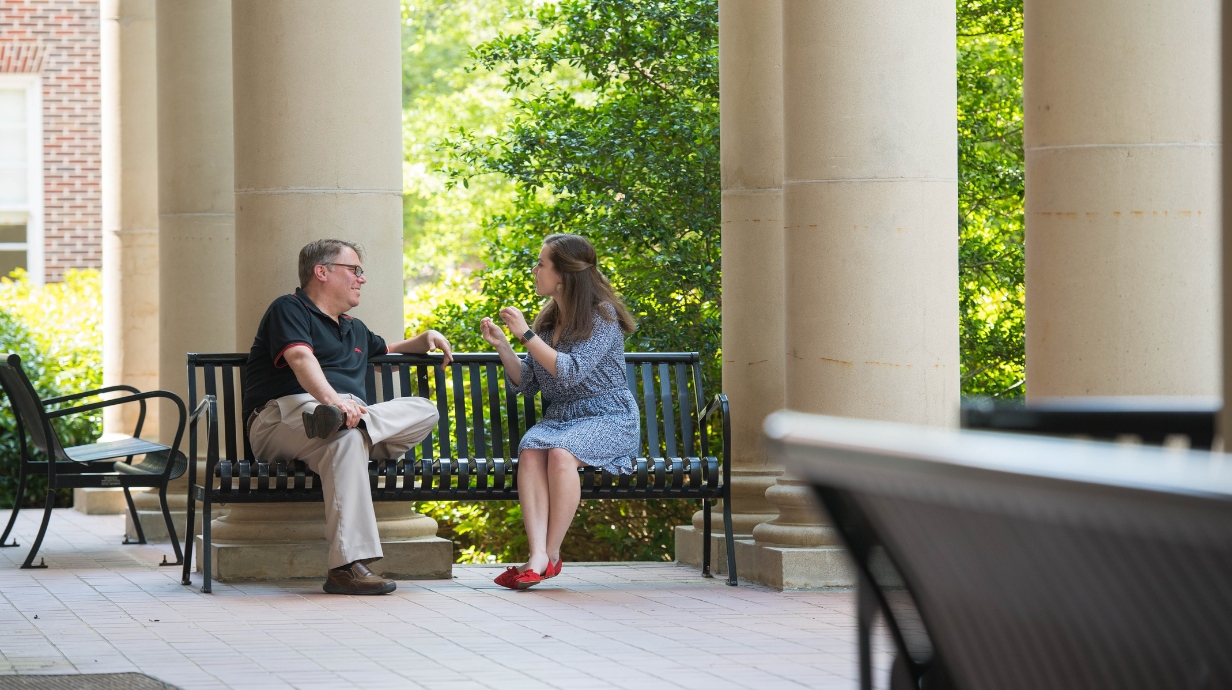
Bachelor of Arts in Linguistics
The Department of Modern Languages in the College of Liberal Arts offers the B.A. in Linguistics. Students come to understand that language is composed of layers of intertwined systems (sound, meaning, organization, and context) as they study phonology, morphology, syntax, semantics, and pragmatics. They explore language as it relates to society, including the relationship between language and social factors such as region, ethnicity, gender, and identity.
Linguistics majors learn how language is acquired, not through imitation, but through a natural process that moves through a series of stages. In linguistics classes, we will explore the
- influence of language on culture,
- influence of technology on language,
- way that language changes over time, and
- importance of context in communication.
The Value of a Linguistics Degree
Linguistics majors acquire valuable skills: analytical reasoning, critical thinking, argumentation, and clarity of expression. They learn how to analyze oral language and texts as a part of an interdisciplinary major that views data within the context of culture - skills sought by many employers.
On this Page…
Program Information
Degree
B.A. in Linguistics
Required Credit Hours
120
Program Type
Major
Minor
Program Location
School
Duration
4 Years
Degree Requirements
Find out about credit hour and course requirements.
Students in the College of Liberal Arts earning the B.A. degree have a common set of 48-50 hours of general education. The specific courses taken to complete the categories of general education may differ between majors.
Categories of General Education:
- First Year Writing I, II
- English Literature Survey
- Modern or Ancient Language
- History
- Additional Humanities
- Fine or Performing Arts Appreciation
- Mathematics
- Social Sciences
- Natural Sciences
To see the details for these general education requirements, visit the UM online catalog or the degree sheet attached at the top of this webpage.
Students in the B.A. in Linguistics complete 30 credit hours of linguistics courses. Students must take at least 9 credit hours at the 500 level. Grades lower than C in linguistics courses will not be counted toward the major. Students completing the B.A. degree in the College of Liberal Arts are also required to complete a minor field of study (or second major).
- Lin 200: Introduction to Linguistic Science
- Lin 303: Phonology
- Two courses (6 credit hours) in theoretical linguistics from:
- Lin 304: Morphology
- Lin 305: Syntax
- Lin 306: Semantics and Pragmatics
- One course (3 credit hours) in Language Change & Variation from:
- Lin 310: Sociolinguistics
- Lin 520: Historical Linguistics
- Lin 511: Dialects of English
- Lin 545: Pidgins and Creoles
- One course (3 credit hours) in Intercultural Communication from:
- Lin 312: Language and Culture
- Lin 561: Multilingual Development & Education
- Lin 572: Cultural Dimensions of Language Education
- Lin 571: Intercultural Communication & Education
- Lin 552: Evaluation & Policy in Lang Education
- Twelve credit hours of linguistics electives
A minor in linguistics requires 18 credit hours of linguistics courses. Grades lower than C in linguistics courses will not be counted toward the minor.
- Lin 200: Introduction to Linguistic Science
- Lin 303: Phonology
- One course (3 credit hours) in theoretical linguistics from:
- Lin 304: Morphology
- Lin 305: Syntax
- Lin 306: Semantics and Pragmatics
- Three courses (9 credit hours) of linguistics electives
Department Opportunities
Video: What is Linguistics?
Hear firsthand from students, faculty, and staff about the Linguistics program.

Meet a Linguistics Major
I chose my majors early on in high school. My AP English teacher inspired me to pursue English because I want to be like her when I’m older. I chose Linguistics because I have a love for languages and how they work. This stemmed from my participation in spelling bees when I was a child.
Emily Suh
Double Major in B.A. in English and Linguistics '24
Welcome to the College of Liberal Arts
As Coordinator of Student Recruitment for the College of Liberal Arts, I work with students, and their parents, who are interested in attending UM for their undergraduate degrees. I coordinate personalized visits to our departments, answer questions about the majors and programs in the CLA and handle all recruitment communications from the CLA. Please feel free to send me any questions you may have. It is my job to make sure you have everything you need to make an informed decision on where to spend your college career, and I hope it will be with the College of Liberal Arts at the University of Mississippi!
Annabelle Harris
Admissions Counselor
Future CLA Students

College of Liberal Arts Undergraduates
We invite future undergraduates to learn about the College of Liberal Arts, the value of the liberal arts education, our programs, career opportunities, and resources to help you succeed. You can also request a personalized degree sheet.
Next Steps
Explore Affordability
We have a variety of scholarships and financial aid options to help make college more affordable for you and your family.
Apply to the University of Mississippi
Are you ready to take the next step toward building your legacy?
